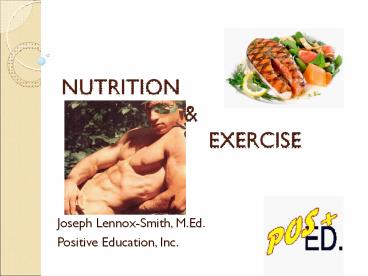NUTRITION - PowerPoint PPT Presentation
1 / 33
Title: NUTRITION
1
NUTRITION EXERCISE
- Joseph Lennox-Smith, M.Ed.
- Positive Education, Inc.
2
Why is Good Nutrition Important?
- Macronutrients
- Calories (energy) proteins, carbohydrates, and
fats - Maintain weight
- Micronutrients
- vitamins and minerals
- Maintain cells and prevent weight loss
3
Why is Good Nutrition Important for those with
HIV?
- With infection the body uses more energy
- When we feel sick we loose our apatite
- Sore throat, mouth, teeth, GI problems
diarrhea, side effects, opportunistic infections
can make you eat less or make you body use less
of what you eat
4
Why is Nutrition Important?
- Loose too much fat
- Loose too much lean body mass
- Wasting syndrome or cachexia can be fatal
- This is not an issue for all patients
- Those with compromised immune systems are most
vulnerable
5
- Lipodystrophy
- Buildup of fat on neck
- Buildup of fat under stomach mussels
- Lipoatrophy
- Loss of mussel and fat on extremities and face
6
(No Transcript)
7
Good Nutrition
- A balanced diet that includes all food groups
8
The Basics - Protein
- Eat plenty of protein and starches, with moderate
amounts of fat - Individualized
- Protein - build and maintain muscles.
- Lean meats, fish, beans, nuts, and seeds are all
good sources of protein
9
Carbohydrates - energy Not all carbohydrates
are created equal
- Complex carbohydrates long chain sugars (good)
- Time release energy - fiber and nutrients.
- Enables the body to burn sugar and fat keeps
insulin levels down - Whole grain Brown rice, oats, buckwheat,
millet, quinoa, amaranth, barley, bulgur, and rye - Pulpy vegetables squash, carrots, parsnips,
rutabaga, - Also onions and legumes like beans and peas
10
Carbohydrates
- Simple carbohydrates (not so good) short chain
sugars are absorbed quickly - Sugars - quick energy
- Usually processed foods like white bread, bagels,
crackers and pretzels, pasta, pastries, puffed
cereals, granola bars, cheese, ice cream, yogurt,
and fruit juice - Fresh or dried fruit, honey, jam, or syrups.
- Caveat diabetes - hypoglycemia
11
The Basics
- Fat energy
- some but not too much
- monounsaturated fats in nuts, seeds, canola and
olive oils, and fish are considered good fats. - saturated fats in butter and animal products
are bad fats.
12
Fats
- Essential fatty acids (Omega 3 6s) are vital
to cell membranes, and the health of the
cardiovascular, immune, reproductive and central
nervous systems. - labeled unrefined oils
- Deplete HDL
13
Omega 3 - Polyunsaturated
- Vegetables flaxseed oil, hazelnut oil, perilla
oil, hemp, pumpkin seeds, soybeans, walnuts,
wheat germ, wheat sprouts, fresh seal vegetables,
leafy greens, and purslane. - Animal Fortified eggs, oils from salmon,
mackerel, herring, cod, sardines, tuna, flounder,
anchovies and cold water fish like trout
14
Omega 6 - Polyunsaturated
- Vegetable safflower, sunflower, corn, soy,
sesame, hemp, raw nuts and seads, legumes,
spirulina, and leafy greens - Animal mothers milk, organ meat, and lean
meats - Oils evening primrose oil, black current oil,
and borage oil
15
Monounsaturates
- Dont cause cholesterol accumulation, raises HDL,
lowers LDL - Vegetable, legume, and seed sources include
Olive, grape seed, macadamia, avocado, almond,
apricot kernel, peanut, high-oleic safflower and
sunflower oils, and rice bran oil
16
Saturated Fats Not so good
- Blocks the metabolism of essential fatty acids
(EFAs) into healthy hormones - Elevates cholesterol
- Avoid commercially processed\fast foods
- Stick with lean meats and non-fat dairy products
- Avoid tropical oils coconut oil, cocoa butter,
peanut oil, palm oil, palm-kernel oil
17
Trans-fatty Acids - BAD
- Hydrogenated and partially hydrogenated fats
linked to heart disease, cancer, obesity,
diabetes, and immune system problems - Synthetic fats
- Increases total serum cholesterol and blood
insulin.
18
Things to Remember
- Cook at home
- Use unprocessed foods
- Read the labels
- It is all about portions my darling
- Hydration
- Exercise
- Nutritional supplements
- Food safety
19
Read the Labels
Olive Oil
Mac Cheese
20
Read the Labels
Pork Beans
Peanut Butter
Frozen Salmon Patties
21
Read the Labels
22
FOR MORE INFORMATION
- You can get more information on nutrition and HIV
from the following - A Clinician's Guide To Nutrition In HIV and AIDS,
by Cade Fields-Gardner and others, published by
the American Dietetic Association, 26 plus 5
shipping and handling The American Dietetic
Association, P.O. Box 97215, Chicago IL
60678-7215 or 800-877-1600, ext. 5000.
23
FOR MORE INFORMATION
- Eat Up! Nutrition Advice and Food Ideas for
People Living with HIV and AIDS by Charlie
Smigelski, RD, 10.00, http//www.eatupbooks.com/h
ivbooks.html - Nutrition and HIV A New Model for Treatment by
Mary Romeyn, MD, 18.95, published by
Jossey-Bass, Inc, telephone 415-433-1740.
24
FOR MORE INFORMATION
- Fact sheets on HIV nutrition are available at
http//www.larklands.net - The Complete Book of Core Training by Kurt, Brett
Mike Brungardt 21.95
25
References
- AIDSinfonet.org (2009) Fact sheet 800,
nutrition. Retrieved 07/20/09 from
http//www.aidsinfonet.org/fact_sheets/view/800?la
ngengWHY_IS_NUTRITION_IMPORTANT__ - Brungardt, K., Brungardt, B., Brungardt, M.,
(2006), The complete book of core training. New
York, N.Y., Hyperion
26
Exercise Grab your balls!
27
Stretch
28
Stretch
29
Abs
30
Balls
31
More Balls
32
Things to Remember
- Patience
- Persistence
- Breath
- Form
- If it hurts rather than burns dont do it
- Start slow and work your way into it
33
Exercise Good Luck!
task_at_pos-ed.org Toll Free 877-966-1558

